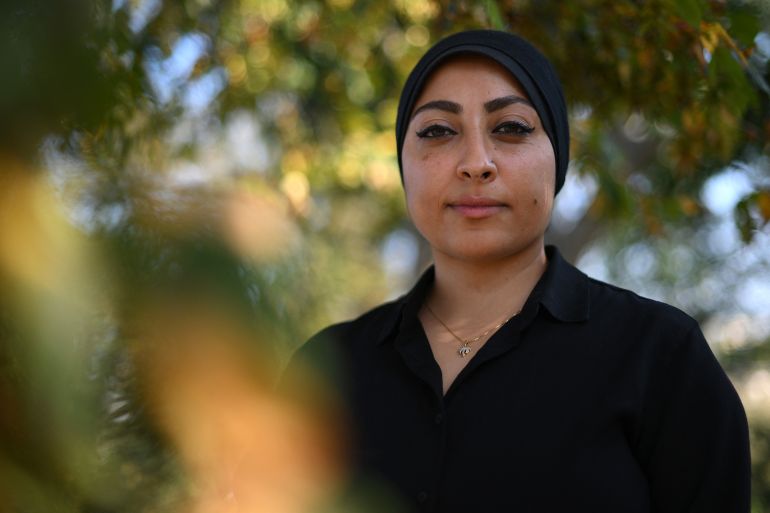Bahrain activist Maryam al-Khawaja denied boarding on UK to Manama flight
Activist says she wants to meet her jailed father Abdulhadi al-Khawaja who is currently on hunger strike.

A daughter of prominent Bahraini rights activist Abdulhadi al-Khawaja said she was denied boarding a flight in London as she tried to return to the Gulf state and press for her father’s release from prison.
Maryam al-Khawaja on Friday said she was told at a British Airways’ counter at Heathrow Airport that she was not allowed to board her flight and should contact Bahraini immigration authorities.
Keep reading
list of 3 items‘Slow murder’: Hundreds of prisoners stage Bahrain’s largest hunger strike
Bahrain prisoners on hunger strike demanding better conditions
“Its incredibly disappointing, this may have been my last chance to see my dad,” she she said in a video message posted on X, formerly known as Twitter, and recorded in British Airways’ check-in area.
“Effectively we are being denied boarding by British Airways on behalf of the Bahraini government.”
"It's incredibly disappointing, this may have been my last chance to see my dad"
Despite @MARYAMALKHAWAJA being a Bahraini citizen she was denied boarding at #London airport and wasn't allowed to get on the plane headed for her home country #FreeAlKhawaja @britshairwys2… pic.twitter.com/XiPb2BeTgM
— #FreeAlKhawaja (@FreeAlKhawaja) September 15, 2023
The Bahraini government said it welcomes all visitors, provided they meet the necessary entry requirements.
“However, as with other countries, Bahrain reserves the right to refuse entry, if deemed necessary,” the government said in a statement sent to the Reuters news agency.
Maryam said she would travel to Bahrain and risk her arrest because her father was denied access to urgent and critical medical treatment, part of the reason why he is on a hunger strike.
Abdulhadi al-Khawaja, also a Danish citizen, is a former president of the Bahrain Centre for Human Rights and is serving a life sentence for his role in Bahrain’s pro-democracy protests in 2011.
A group of activists, who said they would join her, including Amnesty International Secretary-General Agnes Callamard and Front Line Defenders’ Interim Director Olive Moore, were also denied boarding, she said.
“The decision to prevent Maryam Al-Khawaja and the human rights delegation accompanying her from travelling to Bahrain is a shameless attempt by the Bahraini authorities to stop people from speaking out about human rights violations in the country,” Callamard said in a statement.
“The move clearly illustrates the authorities’ utter disregard for international human rights standards contrary to what Bahrain’s Crown Prince pretended during a trip to Washington DC just yesterday.”
Moore said refusing al-Khawaja’s right to freedom of movement was “completely unjustifiable”.
‘Medical negligence’
Maryam al-Khawaja was arrested in 2014 after arriving at Manama airport and accused of assaulting a police officer. She was later released and left Bahrain later that year.
Asked whether there were any charges against Maryam al-Khawaja, the Bahraini government said she was convicted after she assaulted two policewomen in 2014 and she “never served or appealed her one-year sentence”.
“In Bahrain, as with any government with an independent judiciary, individuals who are convicted in a court of law are subject to legal proceedings and due process,” a government spokesperson said.
On Wednesday, Abdulhadi al-Khawaja resumed his hunger strike after authorities did not allow him to get to a scheduled medical appointment, his second daughter, Zainab, told Reuters.
His decision followed an announcement by rights groups that hundreds of other political prisoners had suspended hunger strikes as the government promised to improve prison conditions.
Mary Lawlor, the United Nations Special Rapporteur on the situation of human rights defenders, said the deteriorating health of Bahraini prisoners Abduljalil al-Singace, Abdulhadi al-Khawaja and Naji Fateel was “extremely” concerning.
“Medical negligence and lack of adequate care has left them in a worrying state,” Lawlor said in a statement.
On Wednesday the government denied al-Khawaja was on hunger strike, adding he has “repeatedly and voluntarily declined to attend his regular medical appointments”.